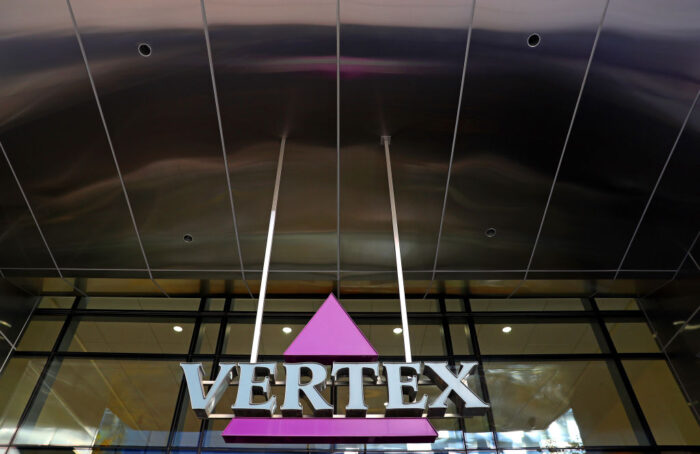Vertex Prescription drugs is buying immune therapies developer Alpine Immune Sciences in a $4.9 billion deal whose centerpiece is a Section 3-ready drug for a persistent kidney dysfunction with few remedy choices. Whereas Vertex frames the drug as a potential blockbuster on this indication alone, the chance goes past kidney illness. Medical growth already underway may pave the best way in a variety of immunological issues, giving the molecule pipeline-in-a-product potential.
In line with phrases of the settlement, Boston-based Vertex can pay $65 money for every share of Alpine. That’s a greater than 38% premium to Alpine’s closing worth on Wednesday, simply previous to the announcement of the deal.
Alpine develops protein-based therapies for autoimmune and inflammatory illnesses. These proteins are made with proprietary expertise that takes native immune system proteins and engineers them with properties that make them higher for therapeutic purposes. The lead program of Seattle-based Alpine is a fusion protein known as povetacicept (previously ALPN-303). Povetacicept’s lead illness goal is IgA nephropathy (IgAN), an autoimmune situation during which the buildup of immunoglobulin A protein results in kidney harm. Also referred to as Berger illness, the persistent situation can finally result in end-stage renal illness. In line with Vertex, 130,000 folks within the U.S. have IgAN.
The deal comes as Alpine has up to date IgAN information from an open-label Section 1b/2a examine. As of March 1, 41 sufferers had acquired both a excessive or low dose of povetacicept, which is run as a subcutaneous injection each 4 weeks. In line with outcomes launched after market shut Wednesday, within the six sufferers who had reached 36 weeks of remedy with the low dose, Alpine reported a clinically significant 64.1% discount in proteinuria, which is the extent of proteins in urine which might be related to kidney illness. This discount was related to steady renal perform as assessed by estimated glomerular filtration fee (eGFR), a measure of kidney perform. All 4 of the sufferers for whom information had been out there at 36 weeks confirmed decision of hematuria, or blood within the urine.
On the excessive dose, Alpine reported proteinuria and hematuria outcomes at weeks 12 and 24 that had been just like ends in the low-dose group. Each doses had been nicely tolerated and no infections had been reported. The info have been accepted for presentation subsequent week through the World Congress of Nephrology annual assembly in Buenos Aires, Argentina.
“We have now seen these information and they’re spectacular,” Vertex CEO Reshma Kewalramani mentioned, talking throughout a Wednesday night convention name.
Earlier in her profession, when she was a working towards nephrologist, remedy of renal illnesses was primarily recycling medicines accepted for cardiovascular or endocrinological illnesses, Kewalramani mentioned. What’s totally different now that there’s larger understanding of the genetics of renal illness and medicines are actually being developed to handle underlying causes.
Kewalramani acknowledged that medicine have not too long ago gained FDA approvals for IgAN. The primary remedy particularly accepted for the illness was Tarpeyo, a corticosteroid developed by Calliditas Therapeutics. Travere Therapeutics’ Filspari is a small molecule that treats IgAN by blocking two pathways related to the dysfunction (Filspari’s future is in query after the drug failed the confirmatory examine required of its accelerated approval). However Kewalramani mentioned these medicine don’t handle the underlying reason behind IgAN.
Alpine engineered povetacicept to dam two targets: B cell activating issue (BAFF) and a proliferation inducing ligand (APRIL). Others are pursuing these targets. Amgen is creating a BAFF-blocking drug. The APRIL-blocking camp contains Otsuka Pharmaceutical subsidiary Visterra in addition to Vera Therapeutics. Novartis is taking a number of approaches to IgAN, together with a drug candidate for BAFF and one other for APRIL. Startups have additionally entered the IgAN discipline with medicine that handle different targets. Kewalramani mentioned the Alpine drug’s intervention in each BAFF and APRIL makes it finest in school. However the Section 2 outcomes nonetheless must be demonstrated in a Section 3 examine. Vertex expects this examine will start within the second half of this yr.
Present scientific growth of povetacicept spans two basket research, one evaluating the drug in autoimmune illnesses, together with IgAN and lupus nephritis, and the opposite testing it in autoimmune cytopenias. Kewalramani mentioned these research are more likely to yield a number of scientific readouts later this yr, providing further alternatives for development. Jeffrey Leiden, Vertex’s government chairman and the corporate’s former CEO, acknowledged that different firms are pursuing these illnesses. However he mentioned a twin inhibitor of each BAFF and APRIL may stand aside in a crowded discipline.
“It stays to be seen, however I believe one of many fascinating issues right here is that by inhibiting BAFF and APRIL, we could not solely simply lower autoantibody secretion, which clearly it does, we may very well have disease-modifying functionality in a few of these illnesses,” Leiden mentioned.
Alpine was based in 2015. The corporate went public two years later through a reverse merger. The corporate initially targeted on creating medicine for each most cancers and autoimmune illnesses, however deserted most cancers following security setbacks in scientific trials.
The Vertex and Alpine boards of administrators have accepted the acquisition, which is anticipated to shut later this quarter. When it does, povetacicept will be part of a Vertex pipeline that features inaxaplin, a small molecule in pivotal testing for APOL-1 mediated kidney illness, and VK-407, a small molecule in Section 1 growth for autosomal dominant polycystic kidney illness.
Photograph: David L. Ryan/The Boston Globe, through Getty Pictures


